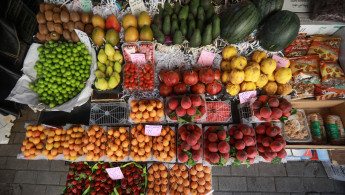'We want to eat': Syrians demand halt to food exports amid rising food prices
Syrians have demanded a halt to food exports in order for more supplies to be provided to local markets and to prevent price increases.
Food exports from the war-torn country have increased during the current Muslim holy month of Ramadan, according to Nabih Al-Sayyid Ali, the former Secretary of the Idlib Chamber of Commerce.
Exports to Gulf countries in particular have shot up, Ali said, adding that the Syrian regime's Ministry of Economy and Chambers of Commerce are "not telling the truth" about export activities.
The Syrian regime denies this, saying exports to Gulf countries have actually decreased.
However, Ali said that an increasing number of trucks have crossed Syria's border with Jordan, and that exports were also being sent through Iraq to Baghdad and Tehran.
The claim comes as price hikes and a collapse of the Syrian lira have hit Syrians hard, particularly during Ramadan, which began on 2 April for most Muslims.
Monthly wages are roughly around 100,000 Syrian liras (US$26, using the black market conversion of 1USD = 3,900 liras) even though family living costs have risen by 600,000 liras this year (US$154).
"They have to stop exporting, we want to eat... are the Gulf countries and collecting dollars more important than the Syrians' needs?" Somaya Al-Aqbani, a woman living in Damascus, told The New Arab's Arabic-language service.
Ali said that Syrian production of tomatoes exceeds the needs of the local market, yet the price of a kilogram has reached 5,000 liras (US$1.28) because of the exports.
He claimed that vegetable prices in the country were now at an all-time high.
A member of the Committee of Traders and Exporters of Vegetables and Fruits in Damascus, Muhammad al-Akkad, denied that there had been an increase in exports of vegetables and fruits, claiming that exports do not exceed five refrigerated lorries per day.
However, Al-Akkad backed up Ali's statement on high prices for tomatoes in Syria.
"The high price of tomatoes is due to exports to the Gulf countries," Al-Akkad said.
He also claimed that tomatoes are one of very few items being exported from Syria.
As Syrians across the country struggle to purchase food, the Russian invasion of Ukraine has also contributed to growing food insecurity in the country.
The prices of grain and other basic goods have skyrocketed, and Syria relies on both countries for the vast bulk of its wheat supply.
Last month, Syrian Prime Minister Hussein Arnous denied any issues with food supplies in Syria, adding that the country had stopped exporting food as a cautionary measure.
However, Arnous' comments were contradicted by his Council of Ministers who announced just two weeks later that public spending would be slashed and basic goods like wheat would be rationed in anticipation of shortages due to the events in Ukraine.





 Follow the Middle East's top stories in English at The New Arab on Google News
Follow the Middle East's top stories in English at The New Arab on Google News


